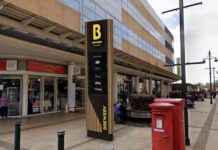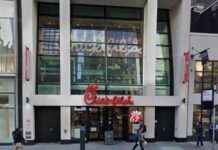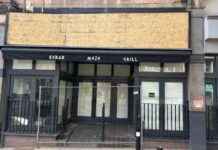Protesters Target Barclays Bank with ‘Free Palestine’ Graffiti and Vandalism
Palestine Action activists have once again made headlines by targeting several Barclays Bank branches in London, leaving behind a trail of smashed windows and red paint as a form of protest against the bank’s alleged investments in Elbit Systems, an Israeli-based weapons company. The incidents occurred at branches in Angel, Whitechapel, East Ham, Mayfair, and Hammersmith, sparking both controversy and debate surrounding the tactics used by the protesters.
The vandalism was not subtle, with windows being smashed and walls covered in red paint bearing the message ‘Free Palestine’. These actions were captured in images shared on social media, including a tweet from Jason Rodrigues, a worker at The Guardian, showing the shattered glass at the Islington branch on Essex Road. The brazen display of defiance against the banking institution was clear, with no attempt to conceal the protesters’ intentions.
In Whitechapel, another branch bore the brunt of the activists’ actions, with multiple windows shattered and red paint splattered across the walls and the Barclays sign. The damage was evident, showcasing the extent to which the protesters were willing to go to make their voices heard. Police cordons were put in place outside the targeted branches, indicating the seriousness of the situation and the response from law enforcement.
Despite the destruction, the message behind the protests was clear. Palestine Action accused Barclays of investing in Elbit Systems, a controversial move that has drawn criticism from various groups. In response, a Barclays spokesperson defended the bank’s financial services to defense companies, citing the importance of such investments in ensuring national security. However, the protesters remained undeterred, continuing their campaign against what they saw as complicity in the conflict in the Middle East.
This is not the first time Barclays has been targeted by protesters. Similar incidents occurred in June, with branches in St John’s Wood and Croydon also being vandalized in a similar manner. The pattern of attacks on Barclays branches reflects a growing trend of activism and dissent against corporate entities perceived to be involved in unethical practices or controversial investments. The actions of Palestine Action have once again brought these issues to the forefront, sparking a debate on the role of financial institutions in global conflicts.
Challenges of Corporate Accountability
The protests against Barclays highlight the challenges of holding corporations accountable for their actions, particularly when it comes to controversial investments in defense companies. While Barclays has defended its financial services to these entities as essential for national security, critics argue that such partnerships can have far-reaching consequences, especially in conflict zones like Palestine.
The issue of corporate accountability is a complex one, with many factors to consider. On one hand, businesses have a responsibility to their shareholders and employees to make sound financial decisions that ensure profitability and sustainability. However, this must be balanced with ethical considerations and the potential impact of these decisions on society as a whole.
In the case of Barclays and its alleged investments in Elbit Systems, the situation is further complicated by the ongoing conflict in the Middle East. The Israeli-Palestinian conflict is a deeply entrenched and sensitive issue, with deep-rooted historical, political, and religious dimensions. Any involvement by external entities, such as financial institutions, can be seen as taking sides and exacerbating tensions.
The Role of Activism in Corporate Governance
Protests like those carried out by Palestine Action against Barclays are a form of activism aimed at holding corporations accountable for their actions. By targeting specific branches and using direct action tactics like vandalizing property, activists seek to draw attention to what they perceive as injustices and compel companies to rethink their policies and practices.
However, the effectiveness of such activism is a subject of debate. While protests can raise awareness and generate media coverage, they can also be divisive and alienate potential supporters. The use of vandalism and property damage, as seen in the attacks on Barclays branches, can also detract from the message being conveyed and overshadow the underlying issues at hand.
In the case of Barclays, the response from the bank has been one of condemnation and increased security measures. The safety of staff and customers is understandably a top priority, and the actions of the protesters have raised concerns about the potential escalation of tensions. Dialogue and engagement between all parties involved are crucial in finding a resolution that addresses the concerns raised by the activists while ensuring the continued operation of the bank.
The Impact of Protests on Public Opinion
The protests against Barclays have undoubtedly sparked debate and discussion among the public, with opinions divided on the actions of Palestine Action and the response of the bank. While some view the protests as a necessary form of activism to bring attention to important issues, others see them as disruptive and counterproductive.
The use of graffiti and vandalism as a means of protest can be polarizing, with some condemning the destruction of property while others support the activists’ right to peaceful dissent. The message of ‘Free Palestine’ painted on the walls of Barclays branches is a powerful statement that resonates with many who feel strongly about the situation in the region.
Ultimately, the impact of protests on public opinion depends on how they are perceived and interpreted by individuals. While some may view the actions of Palestine Action as justified and necessary, others may see them as crossing a line and undermining the cause they seek to promote. Finding common ground and engaging in constructive dialogue is key to bridging the gap between different perspectives and working towards a resolution that addresses the underlying issues.
In conclusion, the protests against Barclays by Palestine Action have brought attention to the bank’s alleged investments in Elbit Systems and sparked a wider conversation about corporate accountability and activism. The actions of the protesters, while controversial, have highlighted the complex challenges of balancing financial interests with ethical considerations in a globalized world. Moving forward, it is essential for all parties involved to engage in meaningful dialogue and find common ground to address the underlying issues and work towards a resolution that respects the concerns of all stakeholders.





















